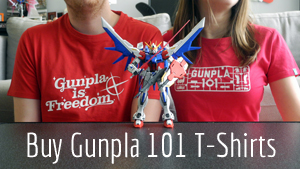
Since 2010 I’ve been learning to build Gunpla and make them look nice. Now I’m going to tell you about the start of my journey to learn to destroy them.
Sometimes an immaculate build isn’t what you’re going for. You may want to convey that this model has seen a lot of action, undergone an atmospheric reentry, or simply gotten really muddy hunting Zeeks in the jungles of Southeast Asia.

I decided to try out battle damage on my Io Frame Shiden after seeing this post from a Reddit user who did a great damage job on his own Io Frame Shiden. At $13, it’s a very replaceable kit, plus the massive shield gave me a big canvas on which to experiment.

First I got all my tools together. I used my Mr. Hobby Mr. Pinvice basic set of manual drills—and I ended up only using the second-smallest one, which is dark blue. I used Tamiya Weathering Master C, my favorite of the bunch since it is so versatile. I used my hobby knife from my Mr. Super Tool Set—my favorite because it comes with so many blade replacements.

Here’s me using the dark blue pin vice. Most of the time I drilled partially through the shield, though eventually I got more daring and drilled a couple of holes all the way through.

The pin vice left neat, circular holes, very unlike what artillery would do. So I scraped the sides in a star pattern using my hobby knife. Next time, I think I would keep these scrapings deeper and closer to the hole without spreading so far out.

Here’s what the shield looks like after just some drilling and scraping.

The knife cuts looked too neat, so I sanded them down with some 1000 grit sandpaper. Bullets would probably melt the shield a bit as they hit, so smoother indentations look more realistic.

Next I took out my weathering kit. As always, I put on painters’ gloves to avoid getting the toxic paint on my hands. You can dampen them for a more vivid look, but I just did dry brushing.
See also: Gunpla Weathering 101

The weathering helps, but I still didn’t think it looked realistic enough.

So for peak realism, I decided to just burn the thing down. I put a plastic cup of cold water on my workspace for safety. I lit a match, held it to each of the holes on the shield, and dropped the match into the cup of water to fully extinguish it.

Finally, I was starting to be satisfied with the look of the damage. Fire and weathering turned out to be a pretty good combination.

After I felt reasonably satisfied with the look of the damage, I gave the shield and the entire kit a matte topcoat. A top coat doesn’t just make the entire kit look more realistic, it also sealed in the weathering powder and even the residue from the matches.
See also: Top Coat Guide For Gunpla

Looking at this now, I realize what I could have done to improve—the weathering is too focused on the impact points. A shield that has seen some action won’t be immaculate everywhere else, it’ll have rust, scrapes, and slashes all over. Next time, I plan to do a more thorough job, like in this Hobbylink.tv damage tutorial.

Thanks for taking a look at my first attempt of adding battle damage! Next time, I plan to invest in a dremel (a small electric drill) for more controlled movements. Any other suggestions for me?







